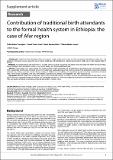Contribution of Traditional Birth Attendants to Formal Health Systems in Ethiopia: the Case of Afar Region
View/
Publication Date
12/26/2012Type
Article, Journalviews
downloads
Metadata
Show full item recordCitation
Tedla Mulatu Temesgen, Jemal Yousuf Umer, Dawit Seyoum Buda, Tilahun Nigatu Haregu. Contribution of traditional birth attendants to the formal health system in Ethiopia: the case of Afar region. Pan Afr Med J. 2012;13(Supp 1):15
Abstract/
Background: Traditional birth attendants (TBAs) have been a subject of discussion in the provision of maternal and newborn health care. The objective of this study was to assess the role of trained traditional birth attendants in maternal and newborn health care in Afar Regional State of Ethiopia. Methods: A qualitative study was used where 21 in-depth interviews and 6 focus group discussions were conducted with health service providers, trained traditional birth attendants, mothers, men, kebele leaders and district health personnel. Results: The findings of this study indicate that trained traditional birth attendants are the backbone of the maternal and child health development in pastoralist communities. However, the current numbers are inadequate and cannot meet the needs of the pastoralist communities including antenatal care, delivery, postnatal care and family planning. In addition to service delivery, all respondents agreed on multiple contributions of trained TBAs, which include counselling, child care, immunisation, postnatal care, detection of complication and other social services. Conclusion: Without deployment of adequate numbers of trained health workers for delivery services, trained traditional birth attendants remain vital for the rural community in need of maternal and child health care services. With close supportive supervision and evaluation of the trainings, the TBAs can greatly contribute to decreasing maternal and newborn mortality rates
Further Details
This article is published as part of the supplement “AMREF´s evidence in advancing the health of women and children” Supplement sponsored by AMREF - African Medical and Research Foundation © Tedla Mulatu Temesgen et al. The Pan African Medical Journal - ISSN 1937-8688. This is an Open Access article distributed under the terms of the Creative Commons Attribution License (http://creativecommons.org/licenses/by/2.0), which permits unrestricted use, distribution, and reproduction in any medium, provided the original work is properly cited
Publisher
Pan African Medical Journal.ISSN
1937-8688Collections
- General - GEN [367]

